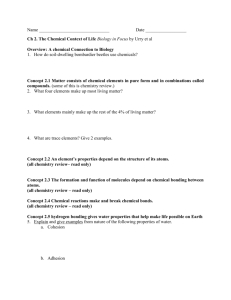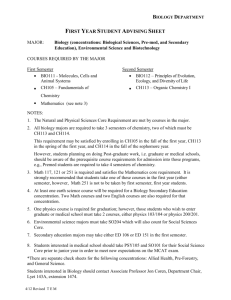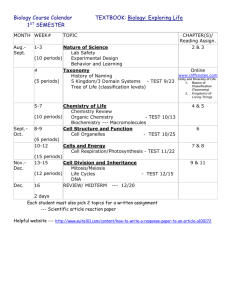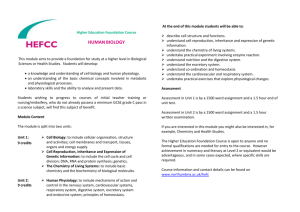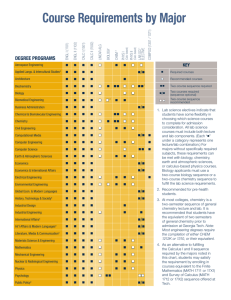Is a Ph.D. in Physics right for you?
advertisement
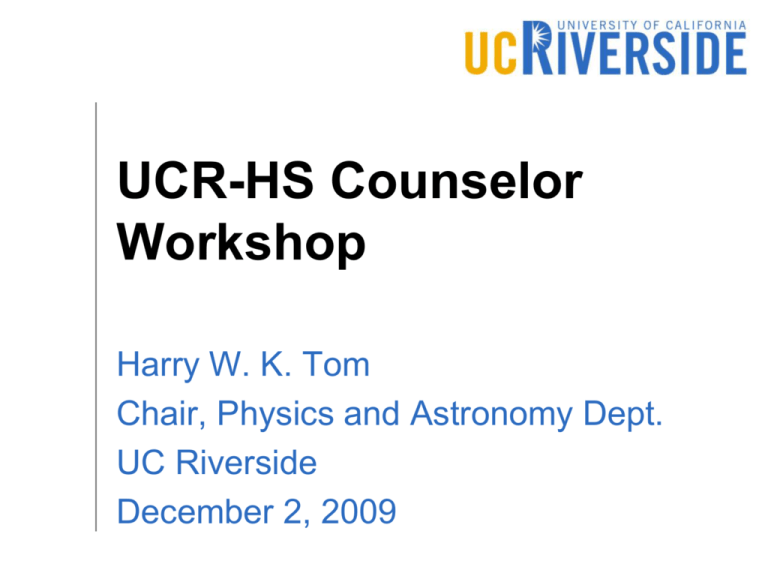
UCR-HS Counselor Workshop Harry W. K. Tom Chair, Physics and Astronomy Dept. UC Riverside December 2, 2009 Welcome UCR Physics and Astronomy Dept Leonid Pryadko, Outreach Committee Chair Michael Horton (RCOE) Science Coordinator and AVID Coordinator Richard Hall (SBCSS) Science/Environmental Education Coordinator Maria Simani UCR Alpha Center Jing Shi Chair, Physics Undergrad Advising Committee Goals of Workshop Find ways to Increase # HS students taking Physics up to State and National averages Discuss the barriers to more Inland Empire HS student taking Physics Create Motivational Materials and Provide Assistance to HS Counselors Inform Counselors about UCR involvement with Physics teachers Explore Other Ways UCR Physics can help Why should we increase # of HS students taking physics? 10 Reasons Why High School Students Should Take Physics Inland Empire HS Physics enrollments lag State by 2X and lag nation by 3X 1. Physics is a core science discipline Physics with Biology and Chemistry are the 3 Fundamental “Core” Science Disciplines Your view of the world, nature, and how things work are incomplete without a knowledge of physics…as incomplete as if you skipped biology or chemistry Physics, more than the other 2 core sciences, uses mathematics and computing which give it a precision, predictive power, and simulation power, that are unprecedented in human history All other science and engineering are based on biology, chemistry, physics and math—physics is required for all science and engineering majors in college You are at an advantage if you have had a high school course in Physics Physics should be the 3rd science course taken in HS Physics is a CORE discipline: ALL science is based on 4 pillars: Math, Biology, Chemistry and Physics UC requires 1 Life Science and 1 Physical Science and recommends a 3rd year of HS Science. Students are advised to take Biology, Chemistry…. 3rd choice should be PHYSICS. Physics is accepted as 3rd science course by UC Anatomy, Physiology, Earth Science are not core disciplines 2. Most modern technology involves physics. Any technology involving electricity, magnetism, force, pressure, heat, light, energy, sound, optics, etc. comes from physics. Basic knowledge required for products like fertilizers, drugs, plastics, and chemicals comes from chemistry and biology, these items have to eventually be manufactured, and manufacturing is dominated by physicsbased technology. 3. HS Physics is the Gateway to Physics, Engineering, and Computing Jobs and Careers Physics along with Biology and Chemistry are the 3 Core Science Discipline All 3 use math, but Physics uses math and computing more Engineering is based on Applied Physics HS Physics begins training students in quantitative science, applied math, and problem solving 4. The job market for people with skills in physics is stronger than for skills in biology and chemistry Engineers are applied physicists and comprise the second largest profession in America (second only to teaching) with about 1.4 million members. By comparison, there are about 600 thousand medical doctors and only around 100 thousand biologists. STEM Careers are dominated by Physics and Computer 1.65M 3.1M Engineering and Computer Science sectors > Life Science/Chemistry sectors 1.1M 0.7M Compare to other sectors: earth science, social science, math 5. Physics is required in college level science—student is at disadvantage without HS Physics 1 year of college level Physics is required for all other science majors At UCR Life-Science Physics is Calculusbased It is a gateway to upper division majors in biology, chemistry, earth science, environmental science, entomology, biochemistry, mathematics, statistics Example: HS Physics is Important for Life Science Majors All College Science Majors require a minimum of 1 year of College Physics—in UC this is a Calculus-Based Physics Course Life Science majors take: Freshman: 1 year of Calculus 1 year of General Chem Sophomore: 1 year of Organic Chem 1 year of Intro Biology 1 year of Physics (Calc based) Junior: 1 year of Biochemistry Lower Division Requirements include Physics before moving into a specific biological major Junior Transfer students must have completed Physics with a minimum GPA requirement Success Rate in Physics 2 (for Life Science) 08W&08S (2B&2C) Mean vs 07F (2A) Grade 08W 2B Grade 08S 2C Grade 4 3.5 3 Mean 2.5 2 1.5 1 0.5 0 0 0.5 1 1.5 2 2.5 07F 2A Grade 3 3.5 4 4.5 6. Physics classes help polish the skills needed to score well on the SAT. Physics classes provide practice in both algebra and geometry. These are the types of mathematics most likely to occur on the SAT. To work physics problems, students must be able to read and comprehend short paragraphs then develop problem solving strategies from them. Physics helps develop both math and verbal skills. Physics is a whole brain subject requiring students to use both right and left brain regions for translating complex verbal information into pictures and finally into mathematical models in order to solve problems. 7. College recruiters recognize the value of physics classes. College recruiters tend to be favorably impressed by transcripts containing challenging classes like physics. They know it is relatively easy to attain a high GPA by taking a light course load. Some technically oriented college programs will deny entrance to students who have not taken high school physics. 8. A knowledge of physics is helpful for understanding the arts. Physics is the science of sound and is needed for understanding how musical instruments work. Physics is also the science of light and is key to understanding visual artwork including paintings, photograph, stage lighting, filmmaking, etc. Even literary works have been influenced by physics. William Faulkner, for example, used the symbolism of time dilation in The Sound and the Fury. Many commonly used expressions in everyday language come from physics, including quantum leap, free fall, light years, black holes, resonance, and being on the same wave length. 9. Physics leads to a better understanding of politics, history, and culture because technology is so important. Supply and use of water, energy resources, technology is the basis for civilization Competition for Resources, Defense and Military technology have shaped history (iron age, bronze age) Quantum Mechanics and Relativity 20th century Global warming 10. Physics offers a deep and unique perspective in itself Physics has set the “scientific method” and has the most stringent requirements for hypothesis and test of hypothesis. Physics theories are not only tested 1000’s of times but a single contrary experiment can force the change of a theory Classical Physics fell from 3 experiments Photoelectric effect, black body radiation spectrum, spectral lines from atoms The (Accelerating) Expansion of the Universe signals a new Physics to include Dark Energy and Dark Matter Summary of STEM job future 1.5X more Physics-Related jobs than Life Science-related 3X more Computer-Related jobs than Life Science-related Life Science and Chemistry jobs are 30% of STEM total HS students who don’t take Physics are unlikely to pursue the majority (70%) of STEM careers US Competitiveness: America Competes Act First University Engineering Degrees, by selected country: 1985-2005 US has not increased number in 20 years, per capita Engineering BS has decreased despite Silicon Valley, Dot.com, Biotechnology USA China S Korea Japan UK Germany Population (millions) 304 Engineering BS/year (1000) % per capita 67 0.02% 1330 450 0.03% 49 128 61 82 75 100 21 12 0.15% 0.08% 0.03% 0.01% Physics Majors World Wide Physics generates the enabling technology, i.e., invention of laser, transistor, integrated circuit, magnetic memory, xray tomography, MRI imaging, PET Impact of US Engineering and Physics competitiveness US needs to increase per capita Engineering and Physics BS production to sustain its #1 technology position in a world Lack of US-trained engineers has forced hiring of large numbers of foreign-trained engineers. Engineering BS and PhD have excellent job prospects Threshold for good positions is “lower” in Engineering/Physics than for Medical School US HS Physics Enrollments 31% of Public HS seniors have taken Physics Virtually 100% of Private HS seniors take Physics Riverside County 2007-8 Riverside Ethnic Intermediat Group e Algebra 60 (13.3 AM IND %) 365 (20.8 ASIAN %) 57 (19.7 PAC ISLD %) 309 (22.4 FILIPINO %) 4,569 HISPANIC (13.6 %) 839 (15.3 AFR AM %) 3,654 WHITE (17.9 %) MULT./NO 181 (14.5 RESP %) County 10,034 Total (15.5 %) 172,404 State Total (17.6 %) Female Advanced 1st Year Math Chemistry 37 (8.2 %) 44 (9.8 %) 575 (32.8 %) 33 (11.4 %) 378 (27.4 %) 3,182 (9.5 %) 517 (9.4 %) 3,536 (17.4 %) 175 (14.1 %) 8,433 (13.1 %) 140,317 (14.3 %) 426 (24.3 %) 56 (19.3 %) 308 (22.3 %) 3,690 (11.0 %) 881 (16.1 %) 3,314 (16.3 %) 212 (17.0 %) 8,931 (13.8 %) 143,066 (14.6 %) Male 1st Year 9-12 Intermediat Advanced 1st Year Physics Enrollment e Algebra Math Chemistry 40 (10.0 12 (2.7 %) 451 27 (6.8 %) 24 (6.0 %) %) 143 (8.2 392 (20.8 580 (30.8 403 (21.4 1,751 %) %) %) %) 42 (13.7 42 (13.7 6 (2.1 %) 290 29 (9.4 %) %) %) 307 (22.2 310 (22.4 277 (20.0 83 (6.0 %) 1,379 %) %) %) 691 3,907 2,640 3,012 33,623 (2.1 %) (11.1 %) (7.5 %) (8.5 %) 104 (1.9 744 (12.8 358 (6.2 708 (12.2 5,471 %) %) %) %) 709 3,391 3,274 2,934 20,371 (3.5 %) (15.8 %) (15.3 %) (13.7 %) 166 (12.8 163 (12.6 168 (13.0 35 (2.8 %) 1,244 %) %) %) 1,783 8,989 7,381 7,568 64,580 (2.8 %) (13.3 %) (10.9 %) (11.2 %) 50,137 159,922 128,241 127,588 979,886 (5.1 %) (15.5 %) (12.4 %) (12.4 %) 1st Year 9-12 Total 9-12 Physics Enrollment Enrollment 11 (2.8 %) 399 850 207 (11.0 %) 1,885 3,636 6 (2.0 %) 307 597 1,386 2,765 35,256 68,879 5,818 11,289 21,407 41,778 1,292 2,536 114 (8.2 %) 748 (2.1 %) 106 (1.8 %) 1,112 (5.2 %) 51 (3.9 %) 2,355 67,750 132,330 (3.5 %) 56,632 1,032,653 2,012,539 (5.5 %) Riverside Physics Enrollment USA: CA State: Riverside: 31% of public HS graduates take Physics 21.2% of graduates take Physics (5.3%X4) 12.6% of graduates take Physics (3.15%X4) All Students: 93% of State Average in Chemistry 60% of State Average in Physics Female Students: 92% of State Average in Advanced Math 95% of State Average in Chemistry 55% of State Average in Physics Male Students: 88% of State Average in Advanced Math 90% of State Average in Chemistry 64% of State Average in Physics Slightly Lower for San Bernadino County Enrollment by Ethnic Group RCOE 38.5% 17.4% 7.4% 8.4% Impact to IE Youth 3X lower access to high tech education, jobs, and careers than national average Less competitive for better 4-year colleges which look favorably on harder college prep Lack experience with quantitative science, applied math, physical intuition and technical problem solving Quality of HS Physics teaching is lower because teachers do not teach Physics full time Why College Bound need HS Physics All Science and Engineering students must take and pass College Physics Premeds-Biology majors need to take Physics 2nd year…at all UC’s Physics is Calculus-based Engineers-Chemistry-Physics majors must take Calculus-Based Physics freshman year Students are less likely to do well in College Physics if they have not taken HS Physics Why College Bound need HS Physics Non-science/engineering majors must take 1 Physical Science course—combined with HS Chemistry and HS Physics….barely sufficient for careers in technology sector in administration, sales, repair and service. HS Physics could be a significant fraction of total Physical Science education. Female Student Enrollment Physics Increases by Course Physics as college prep Physics Teaching Assignment Teachers have more difficulty preparing when they are assigned primarily non-physics What do Physicists do? Explore new phenomena and seek new fundamental understanding (physics-academiaresearch) Apply physics in new ways to other science and engineering disciplines (applied physics, biophysics, chemical physics, material science, academia-research) Apply physics to solve real world problems (nuclear physics, biomedical physics, materials physics, device physics, environmental physics—research--industry) What do Physicists do? Use disciplinary skills in abstraction, model building, mathematics and computing to solve technical problems (production and manufacturing, stock market modeling) Use physics knowledge for business, technical sales, patent law, science administration, and policy (science, education, defense, environmental) Teaching at K-12 and higher levels What Do Physics BS graduates do? 40% get immediate employment 36% in Physics/Astronomy Graduate School 20% in “other” Graduate Study Medical/Dental/Health Professional Law (especially business or patent) Business (especially tech sector) Engineering (Electrical, Material Science, Mechanical, Chemical, Aeronautical) Chemistry & Physical Chemistry Biochemistry/Biology/Biophysics/ Bioengineering BS Initial Employment 40% get jobs immediately BS Private Sector and Salary What do PhD’s vs BS’s do? Academia Ph.D.’s teach at community colleges, state universities (CSU) and research universities (UC) B.S. teach K-12 Government Ph.D.’s do scientific research at national laboratories (LANL), administer science programs as science specialists (NSF), serve as scientific experts in government agencies (DOE) B.S. work as lab assistants in government labs, or serve in administrative roles in scientific agencies, or assist scientific experts in government labs. What do PhD’s vs BS’s do? Industry Ph.D.’s do scientific or engineering research (IBM, HP), provide intellectual property for companies, serve as technical managers B.S. work as physicist/engineer on current projects, assist Ph.D.’s on research projects as lab assistants or technicians, work in technical sales or production and production management. Physicist work in Academia, Government, Private Industry and High Schools Skills used by Physics PhD’s Getting a PhD/Permanent Job BS degree 4 years [MSc program: typically 2 years can be terminal degree or prep for PhD—can apply to PhD program towards end of completion] PhD program: typical 6.5 years, 5-8 years range (theory shorter, experiment longer) MSc is typically included along way in 2 years Postdoctoral Research Position: 2-5 years of additional “post-PhD” training, depending on field and desired job Initial Employment for PhD’s Ph.D. Starting Salary & Sector Reasons for taking postdoc Initial Employment by subfield Ph.D. salaries (median age) Paying for a PhD degree Almost all PhD granting programs in Physics provide financial aid Teaching Assistantships (1-2 years) Fellowships (1-2 years) Graduate Research Assistantships (years 3-end) Admission to a graduate program is essentially receiving a scholarship—provided you make satisfactory progress Demanding undergraduate curriculum, good grades, GRE scores, undergraduate research participation/internships increase your chances Job Sector Growth Reasons to get a PhD at UC Riverside Harry W. K. Tom Chair, Physics and Astronomy Dept. UC Riverside Distinguished Faculty 29 Faculty Junior Faculty Awards 5 National Science Foundation Career Award 1 Sloan Research Fellow 2 Office of Naval Research Young Investigator Award 3 Dept of Energy Outstanding Junior Investigator Award 18 Full Professor Honors APS Panofsky Prize (High Energy) Humboldt Fellowship Guggenheim Fellowship 9 APS Fellows 5 AAAS Fellows Growing Graduate Program Graduate enrollment has grown from 66 to 109 in last 5 years Expected enrollment for Fall 2010 is 116 and Fall 2011 is 125. Entering class ~24 students, 10 foreign, 14 domestic provides critical mass for student cohort, student breadth, national and international diversity and full graduate curriculum Full Graduate Curriculum 29 graduate courses offered 26 each year, 3 courses in alternate years 17 core courses (first year), and 12 electives Ph.D. in Physics with Emphasis in 7 tracks Nuclear and Particle Physics Condensed Matter, Surface, Optical Physics and Biophysics Astrophysics Cosmology and Astroparticle Physics Environmental Physics Materials and Nanoscale Physics Astronomy. Research Infrastructure/Activities ~$7M Extramural Grants/year Support for > 20 Postdoctoral Researchers, 3-5 Research Scientists giving students 29 faculty and 25 additional PhD’s to train with Weekly Dept colloquium and topical seminars bring outside physicists and astronomers to campus Condensed Matter Nanoscale Science and Engineering Astronomy High Energy Graduate Program Highlights Outstanding Multidisciplinary Training and Research Opportunities For Condensed Matter with UCR Center for Nanoscale Science and Engineering with faculty from Chemistry and Engineering College For Biophysics with UCR’s Biochemistry/Molecular Biology and Bioengineering For Environmental Physics with joint MSc program with UCR Environmental Science Graduate Program Highlights High Energy and Relativistic Heavy Ion Physics programs highly leveraged with international collaborations at LHC, RHIC, SLAC, Fermi Lab Astronomy program well-leveraged with UC telescopes (Keck and future TMT), Southern California astronomy infrastructure, and access to SpARCS and COSMOS survey data 7. College success for virtually all science, computing, engineering, and premedical majors requires passing physics. Engineering is largely applied physics. Pre-medicine majors typically must take a 1 year course in Physics. About 25% of the science knowledge required for the MCAT (Medical College Admission Test) is based on physics. Studies indicate that a high quality high school physics course helps significantly reduce the failure rate in college-level physics. Students themselves typically indicate that high school physics is a significant factor in their ability to handle college-level physics material.

